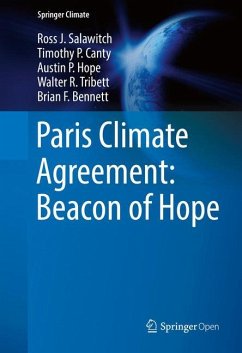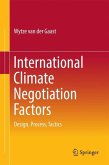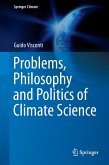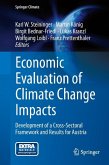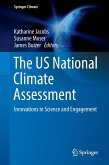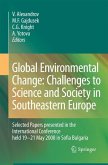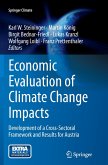This book is open access under a CC BY 4.0 license.
This volume presents an Empirical Model of Global Climate developed by the authors and uses that model to show that global warming will likely remain below 2ºC, relative to preindustrial, throughout this century provided: a) both the unconditional and conditional Paris INDC commitments are followed; b) the emission reductions needed to achieve the Paris INDCs are carried forward to 2060 and beyond.
The first section of the book provides a short overview of Earth's climate system, describing and contrasting climatic changes throughout the planet's history and anthropogenic changes post-Industrial Revolution. The second section describes the climate model developed by the authors (Canty et al., Atmospheric Chemistry and Physics, 2013) and contrasts the model with climate models used in the Intergovernmental Panel on Climate Change (IPCC) 2013 Report. Chapter 3 examines both the unconditional (i.e., firm commitments) andconditional Paris INDCs (commitments contingent on financial flow and/or technology transfer) through the lens of their climate model and concludes that if all of the Paris INDCs are followed, then they are indeed a beacon of hope for Earth's climate. The fourth part of the book offers a perspective of energy needs and subsequent emissions reductions required to meet the Paris temperature goals, illuminating challenges faced both in the developing world and the developed world.
Throughout the book, easy-to-understand charts and graphics illustrate concepts. The scientific basis of Chapters 2 and 3 was first presented in a keynote session of the 96th Annual Meeting of the American Meteorological Society in January, 2016.
This volume presents an Empirical Model of Global Climate developed by the authors and uses that model to show that global warming will likely remain below 2ºC, relative to preindustrial, throughout this century provided: a) both the unconditional and conditional Paris INDC commitments are followed; b) the emission reductions needed to achieve the Paris INDCs are carried forward to 2060 and beyond.
The first section of the book provides a short overview of Earth's climate system, describing and contrasting climatic changes throughout the planet's history and anthropogenic changes post-Industrial Revolution. The second section describes the climate model developed by the authors (Canty et al., Atmospheric Chemistry and Physics, 2013) and contrasts the model with climate models used in the Intergovernmental Panel on Climate Change (IPCC) 2013 Report. Chapter 3 examines both the unconditional (i.e., firm commitments) andconditional Paris INDCs (commitments contingent on financial flow and/or technology transfer) through the lens of their climate model and concludes that if all of the Paris INDCs are followed, then they are indeed a beacon of hope for Earth's climate. The fourth part of the book offers a perspective of energy needs and subsequent emissions reductions required to meet the Paris temperature goals, illuminating challenges faced both in the developing world and the developed world.
Throughout the book, easy-to-understand charts and graphics illustrate concepts. The scientific basis of Chapters 2 and 3 was first presented in a keynote session of the 96th Annual Meeting of the American Meteorological Society in January, 2016.

